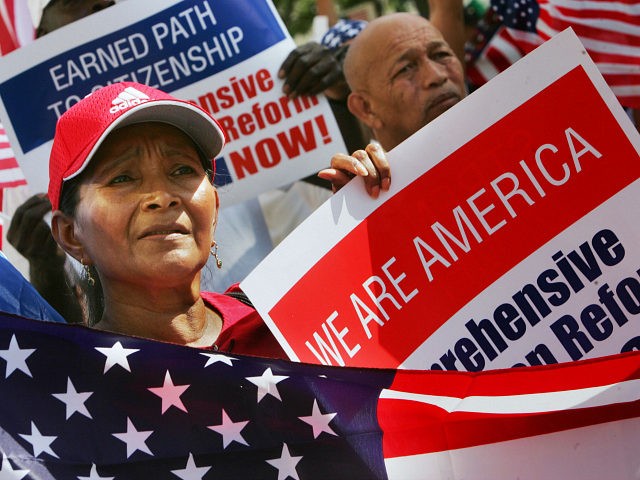President Joe Biden’s deputies have decided not to appeal a federal judge’s decision that kills their unprecedented “parole pathway” for a huge population of economic migrants.
The decision is likely a gamble that a pending Supreme Court case will nullify the March 8 decision by Florida-based district court Judge T. Ken Wetherell, said Andrew Arthur, a former immigration judge who now works at the Center for Immigration Studies.
“We need to see how it plays out,” Andrew told Breitbart News, adding:
Keep in mind Texas vs United States is pending before the Supreme Court. If the Supreme Court says you can’t vacate an action under Title II, then this [Wetherell] decision goes away anyway. This is a “vacatur,” and [Wetherell] says “Look, I understand that this is an open question, [and] the Supreme Court is going to decide [it], and this will change my order if they decide I can’t issue a vacatur.”
The Supreme Court is expected to decide the United States vs Texas case by the end of July. The case deals with judges’ authority to intervene when administrations argue that they cannot enforce a law.
The decision is a big win for Florida’s Gov. Ron DeSantis and Florida Attorney General Ashley Moody, who argued Biden’s catch-and-release policy violates federal law and imposes economic burdens on the state.
The White House’s decision to not appeal Wetherell’s decision was published by the Miami Herald:
Biden administration has declined to appeal a decision from last week that blocks a key Department of Homeland Security program that has helped the agency relieve migrant congestion at the U.S. southern border
In his March 8 decision, Wetherell wrote that Biden and his deputies have converted Americans’ border:
…[into] little more than a speedbump for aliens flooding into the country by prioritizing “alternatives to detention” [ATD] over actual detention and by releasing more than a million aliens into the country—on “parole” or pursuant to the exercise of “prosecutorial discretion” under a wholly inapplicable statute—without even initiating removal proceedings.
The “parole+ATD” decision knocks down central tools of Biden’s pro-migration border policy and exposes migration problems that Biden wanted to hide in the 2024 election. Those self-inflicted problems include Biden’s planned take-down of the Title 42 border barrier in May.
Biden’s policies are being used to counter four political problems created by his campaign promise to end President Donald Trump’s border rules.
Alejandro Mayorkas, Biden’s progressive, pro-migration border chief, is dangling the “Parole+ATD” quasi-legal pathways to divert the flood of Biden migrants in Mexico from the chaotic cartel-run routes. This diversion is intended to keep the border crush off the evening news during the 2024 election.
Mayorkas is also trying to aid the Democrats’ business wing, which expects many additional migrant workers, renters, and consumers above the roughly one million per year level approved by Congress in 1990. He told CNN on March 7:
We need immigration … I’ve engaged extensively with the business community. There are 10 million open jobs. There’s a [business] clamoring for individuals to fill them.
The pathways also are a political gift to the Democrats’ progressive wing, which argues their “equity” goal means foreigners have as much right as Americans to jobs and housing in the United States.
The policy is also used to create a new path for Mexican migrant workers. That gift provides Mexico’s government with an incentive to suppress the cartel’s chaotic delivery of their migrants to the U.S. border. If the U.S. cannot operate the Mexican parole pathway, then Biden’s deputies will have fewer levers to encourage Mexico to help hide the massive parole migration.
The “Parole+ATD” pathway struck down by the judge was intended to annually welcome at least 240,000 migrants who travel into Mexico.
But Mayorkas created a second parole pathway in January to admit roughly 360,000 more migrants each year flown in from four major countries.
In January, “we created [parole] pathways for [360,000] individuals [annually] from Cuba, Haiti, Nicaragua, and Venezuela,” to migrate into the United States, Mayorkas told CNN in an interview broadcast on March 7. He continued:
The population of those countries, the individuals coming from those countries, whom we encounter at our southern border has dropped more than 95 percent [because of the safer and cheaper parole pathway]. Remarkably, by the way, that successful program is being challenged in the courts. In Texas and elsewhere. And it mystifies me why, if there’s a complaint about the number of encounters, why someone would attack, a solution that is proving so successful,
The second parole pathway is facing a second lawsuit from Florida and 19 other states.
Judge Wetherell’s decision also aimed Biden’s broad use of the parole pathway — so bolstering the lawsuit against the four-country parole pathway:
The Court concludes that [Biden’s parole policy] is contrary to law in three ways: (1) it does not contemplate a return to custody once the purposes of parole have been served; (2) it does not comply with the case-by-case requirement; and (3) it does not limit parole to urgent humanitarian reasons or significant public benefit.
Overall, the two pathways would raise immigration levels by 60 percent above Congress’s cap, or to about one migrant for every two American births annually.
The ATD and parole policies encourage and enable economic migration for poor countries in Central America, Africa, and elsewhere.
They enable migration because they reassure poor foreigners that they will be able to easily migrate into U.S. jobs that pay off their debts to the criminal smugglers. Economic migration would largely stop if migrants believed they would not be able to get the U.S. jobs they need to repay their smuggling debts.
The case is Florida v. United States of America, 3:21-cv-1066-TKW-ZCB, in the U.S. District Court Northern District of Florida.

COMMENTS
Please let us know if you're having issues with commenting.